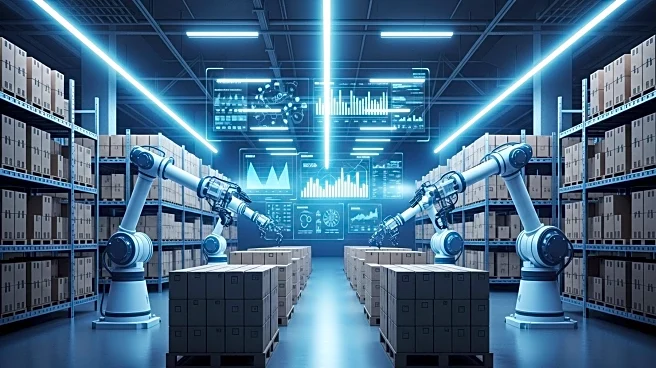What's Happening?
The logistics industry is undergoing a significant transformation driven by the adoption of data-driven technologies and performance metrics. In 2025, the integration of real-time visibility, predictive analytics, and carrier performance management has become essential for survival in the volatile global supply chain. This shift presents a golden opportunity for investors to capitalize on firms that are redefining efficiency, resilience, and scalability through strategic use of key performance indicators (KPIs) and advanced analytics. Technologies such as IoT and digital twins enable real-time tracking of orders and inventory, while predictive analytics allows firms to anticipate disruptions and optimize operations. Carrier performance management has become a critical differentiator for third-party logistics providers, with key metrics like order accuracy and on-time delivery becoming strategic imperatives.
Why It's Important?
The transformation in the logistics industry is crucial as it aligns with global sustainability goals and enhances operational efficiency. Firms that prioritize KPI-optimized operations and AI integration are poised to dominate the industry, which is increasingly shaped by speed, precision, and sustainability. Investors are encouraged to allocate capital to 3PLs and tech platforms that embrace these trends, as they offer long-term value creation in a rapidly evolving market. The financial benefits of KPI-optimized logistics include reduced stockouts and overstocking, lower carrying costs, and improved route efficiency. This shift not only optimizes costs but also supports environmental sustainability through renewable energy-powered fleets and circular supply chains.
What's Next?
As the logistics industry continues to evolve, firms will likely focus on further integrating AI and automation to enhance productivity and sustainability. Investors may see increased opportunities in companies that leverage these technologies to align with global sustainability goals. The industry is expected to witness significant growth in the AI-in-logistics market, with fully deployed AI solutions projected to boost productivity by over 40% by 2035. Companies that successfully implement these technologies will likely gain a competitive edge, driving further investment and innovation in the sector.








